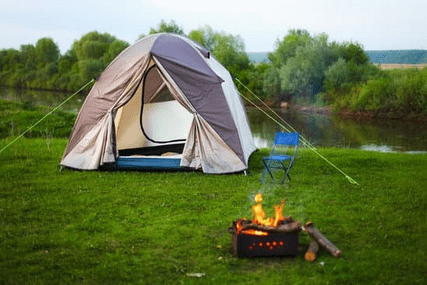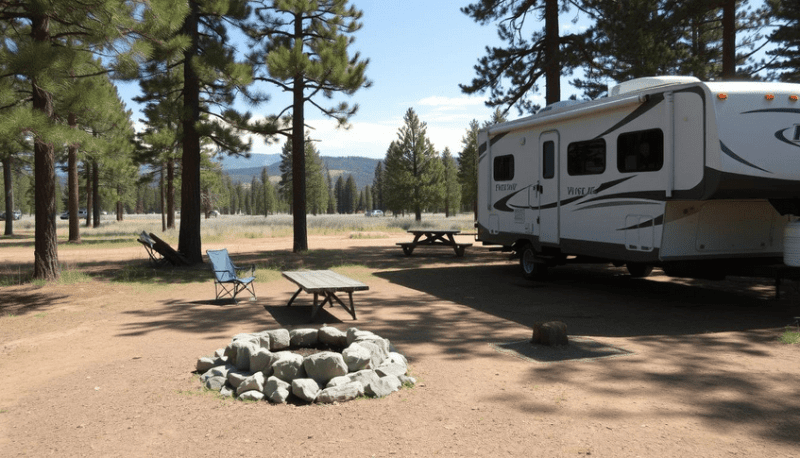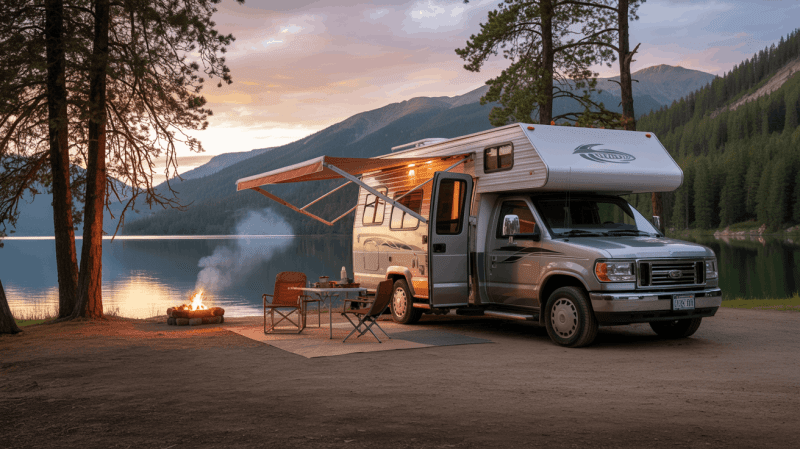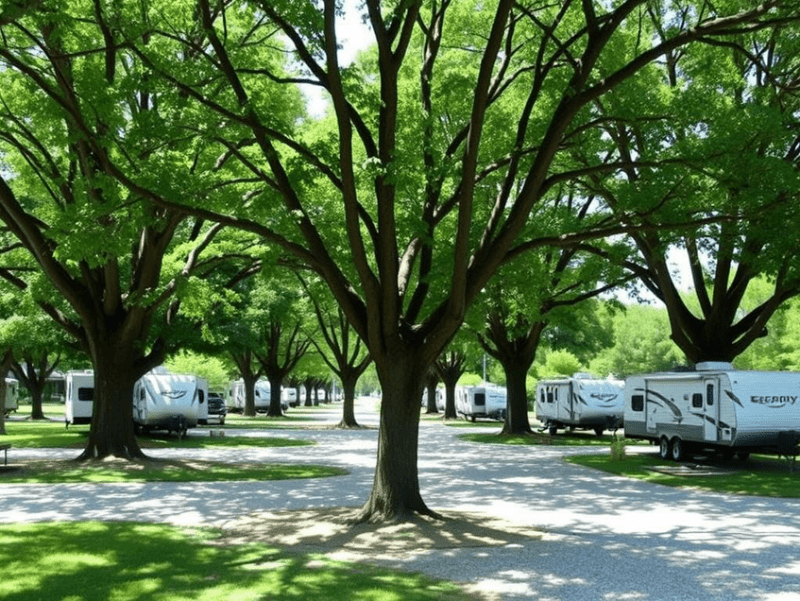Deciding between glamping and camping can be tricky as each has its own charm and appeal. If you love the idea of nature without giving up comfort, glamping might be perfect for you. Camping, on the other hand, offers a more traditional outdoor experience, complete with tents and less luxury.

Glamping, short for "glamorous camping," allows for unique stays in yurts, treehouses, or luxury tents with many modern comforts. Camping is more about immersing oneself in nature with minimal amenities, providing a more rustic and adventurous feel.
Each option fits different preferences, budgets, and experiences, from cozy retreats with soft beds to roughing it with just the essentials. Understanding what you want from your outdoor adventure can help make the right choice for your next getaway.
Key Takeaways
- Glamping combines comfort with nature.
- Camping offers a traditional outdoor experience.
- Choose based on your comfort and adventure needs.
Understanding Glamping and Camping
Glamping offers a luxurious outdoor experience with modern comforts, while traditional camping focuses on simplicity and connecting with nature.
Defining Glamping and Its Luxuries
Glamping is a combination of "glamorous" and "camping." It brings modern comforts to outdoor adventures. Glampers often stay in fully equipped tents, yurts, or cabins. These accommodations may feature comfortable beds, electricity, and even Wi-Fi. Some glamping sites offer private bathrooms, heating, and air conditioning.
The goal is to enjoy nature without giving up comfort and convenience. This appeals to people who want an outdoor experience but prefer not to rough it. Glamping lets individuals enjoy scenic views while having access to gourmet meals and luxurious amenities.
Exploring Traditional Camping and Its Charm
Camping is about immersing oneself in nature using basic gear like tents, sleeping bags, and cooking equipment. Traditional campers look for simplicity and the raw beauty of the outdoors. There are few modern amenities, and this offers a sense of adventure and resourcefulness.
Campers might cook over a fire, filter their water, or explore without a guide. The focus is on being self-reliant. This experience can build a deep connection to nature, inviting individuals to unplug and engage with the environment directly. Camping is perfect for those who enjoy simplicity and the rewards of working with nature.
Types of Accommodations and Locations

When choosing between glamping and camping, the type of shelter and its location play a significant role in the experience. Glamping offers unique and luxurious options, while camping is all about simplicity and nature.
Varied Shelter Options in Glamping
Glamping sites provide a range of interesting accommodations, from yurts and treehouses to luxury tents. These shelters often come with amenities like beds, electricity, and even Wi-Fi, providing a comfortable stay. Such sites can be found in diverse locations, including national parks and private estates.
For those looking for a unique stay, treehouses and yurts offer an adventurous yet comfortable vibe. You'll find glamping spots nestled in scenic areas, allowing for a blend of luxury and nature.
Classic Camping Accommodations
Traditional camping focuses on simple accommodations, such as tents or campers. Many campers enjoy pitching tents in national parks, where they are surrounded by raw nature. This experience emphasizes self-reliance and minimalism.
Camping locations often include quiet spots by rivers, in forests, or near mountains. Many areas designated for camping are well-maintained and offer basic facilities like restrooms and fire pits. This simplicity brings a closer connection to the natural world, ideal for those seeking a more genuine outdoor experience.
Comparing Costs and Preparations

Glamping and camping involve different levels of cost and preparation. Glamping offers luxury accommodations with ready-made setups, while traditional camping requires specific gear and supplies to fit the environment.
Investment in the Glamping Experience
Glamping accommodations often involve a higher initial cost compared to camping. Prices for glamping can range from $150 to $500 per night, depending on luxury level and location. This cost includes tents or cabins with furniture, electricity, and sometimes private bathrooms.
Individuals need to bring essentials like clothing and personal items. The setup is mostly taken care of, which reduces preparation time. Glamping tends to appeal to those who value comfort and are willing to spend more for convenience.
Budgeting for a Traditional Camping Trip
Traditional camping is more budget-friendly, with campsite fees often ranging from $10 to $50 per night. The main costs involve gear such as tents, sleeping bags, and cooking equipment.
Preparation requires careful planning, such as packing food and supplies. This can be time-consuming, but offers a genuine outdoor experience. Campers often need to set up their own sites and manage resources to ensure a pleasant stay.
Traditional camping suits those who prefer self-sufficiency and the natural setting without added amenities.
Amenities and Comfort Levels

When choosing between glamping and camping, the amenities and comfort levels play a significant role. Glamping offers luxurious touches like cozy beds and private bathrooms, while traditional camping focuses on simpler joys such as being close to nature with basic facilities.
Creature Comforts Offered in Glamping
Glamping combines the outdoor experience with hotel-like comfort. Accommodations often feature comfortable beds with high-quality linens. Many glamping sites provide private bathrooms, offering more privacy than public campgrounds. Hot tubs and spa services are also available at some locations, adding to the sense of luxury.
Gourmet dining can be another highlight, with some sites offering chef-prepared meals. Guests might enjoy fancy breakfast spreads or dinner under the stars. Electricity and Wi-Fi are frequently available, ensuring guests stay connected and comfortable.
What to Expect With Camping Amenities
Camping typically offers basic amenities that encourage a more rugged experience. Sleeping arrangements are usually tents set up by visitors themselves, using sleeping bags or mats. Facilities might include shared restrooms and small cooking areas or grills.
Campers often bring their own supplies for cooking and sleeping. This can include portable stoves, coolers, and folding chairs. While hot tubs and gourmet dining are rare, camping provides a chance to cook over open fires, gaze at the stars, and enjoy nature's simplicity.
Comfort levels in camping vary, depending on the location and personal preparedness. Getting close to nature often outweighs the lack of luxury, offering a different kind of relaxation.
Activities and Experiences

Whether it's the comfort of a luxury tent or the rustic charm of a tent pitched by a campfire, both glamping and camping offer unique ways to enjoy the great outdoors. These experiences often include various outdoor activities and chances to connect with nature.
Adventure and Leisure in Glamping
Glamping combines the thrill of outdoor living with modern comforts. Guests can enjoy activities like guided nature walks, wildlife safaris, or hot air balloon rides. It's a chance to explore wilderness areas without sacrificing luxury.
Many glamping experiences offer gourmet meals prepared by chefs. Guests might savor these culinary treats while enjoying stunning views. For those seeking relaxation, some glamping sites feature spa services or yoga sessions, helping travelers unwind amidst nature.
Unique accommodations also make glamping appealing. Lodges, yurts, and treehouses offer memorable stays. These setups provide a chance to disconnect from technology while appreciating the serene surroundings.
The Great Outdoors and Camping Activities
Traditional camping brings a more hands-on approach to enjoying the great outdoors. Campers often engage in activities such as hiking, fishing, or birdwatching. These experiences foster a deep connection with nature.
Campfire cooking is a staple of camping experiences. Preparing meals over a fire creates a sense of camaraderie. Sharing stories and adventure tales around the campfire enhances the experience.
Camping encourages a simpler lifestyle. It's an opportunity to unplug and focus on basic joys, like stargazing. Spending nights under the stars can be a profound way to appreciate the natural world.
Frequently Asked Questions
Glamping combines nature with comfort, offering amenities like beds and bathrooms, while traditional camping focuses on a rustic experience. This appeals to those wanting more convenience and less set-up work, and suits people who are not used to staying outdoors.
What are the main differences between glamping and camping?
Glamping usually includes luxury features such as electricity, comfortable beds, and private bathrooms. Camping is more basic, often using tents with sleeping bags and makeshift facilities.
Why might someone choose glamping over traditional camping?
People might choose glamping for a more comfortable stay with less effort in setting up. It allows enjoying nature without sacrificing modern comforts, making it appealing for those seeking relaxation.
What amenities are typically offered at a glamping site?
Common amenities at a glamping site include running water, electricity, and full-sized beds. Some locations even have air conditioning, heating, and private kitchens, making the experience closer to staying in a hotel.
Can glamping provide a nature experience comparable to camping?
Glamping can still offer a rich nature experience through locations close to scenic areas. Even with added conveniences, it remains possible to enjoy the outdoors, similar to traditional camping.
What types of accommodations can you expect when glamping?
Glamping accommodations vary widely. Options include yurts, treehouses, and safari tents. Each type offers unique settings and facilities aimed at providing comfort while being close to nature.
Is glamping a suitable option for those not accustomed to the outdoors?
Glamping is ideal for those not used to being outdoors. It provides a way to experience nature with the safety and familiarity of home comforts, which makes it less intimidating for beginners.
DISCLAIMER
This document is provided for general information purposes only and should not be relied upon as providing legal advice, technical, or specific operational guidance to the reader, whether as to the practices described in the document or the applicable legal requirements and regulations. bestcampingdeals.com expressly disclaims any responsibility for liability arising from or related to the use or misuse of any information in this document.




